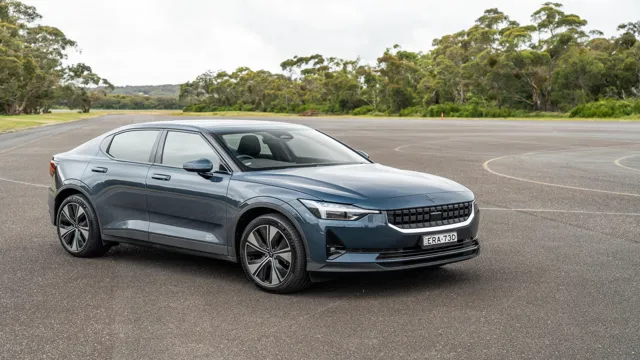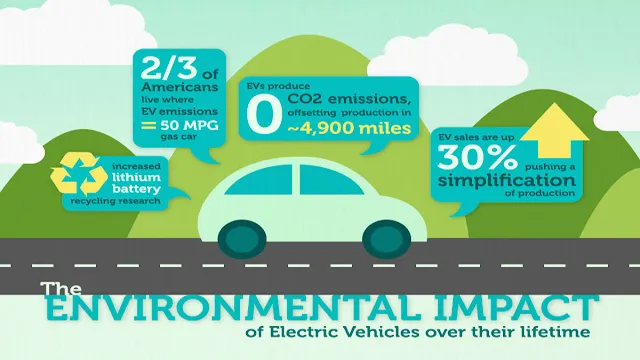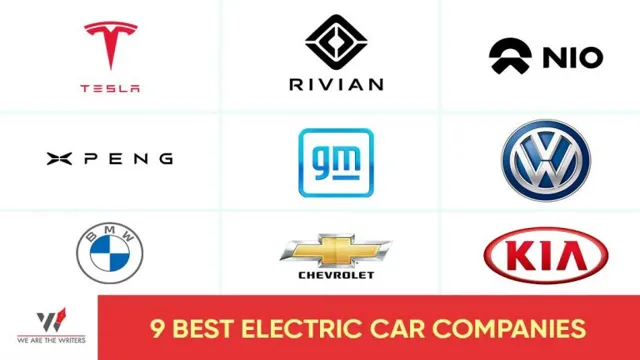Drive Your Savings Home: The Top Tax Benefits of Owning an Electric Car
Have you ever considered purchasing an electric car? Aside from their obvious environmental benefits, electric cars come with a host of tax incentives that make them a smart choice both for you and for the planet. The federal government is currently offering tax credits of up to $7,500 for the purchase of an electric car, depending on the make and model. But the benefits don’t stop there.
Many states offer additional incentives, such as tax rebates, reduced registration fees, and access to carpool lanes. Plus, electric cars are exempt from many state and local taxes, making them a great way to save money while reducing your carbon footprint. In this blog post, we’ll dive deeper into the tax benefits of electric cars and explore just how much you could save by going electric.
So buckle up and let’s get started!
Lower Federal Taxes
If you’re considering buying an electric car, one of the biggest advantages to keep in mind is the tax benefits. Lower federal taxes are a huge incentive to help make the switch to a more environmentally-conscious mode of transportation. With a federal tax credit of up to $7,500, EV drivers can potentially save thousands of dollars on their taxes.
In addition, some states also offer extra tax benefits and rebates, which can make buying an electric car even more cost-effective. It’s important to note, however, that tax incentives can vary depending on the specific vehicle and the year it was purchased. So, before making a purchase, it’s always a good idea to do your research and consult with a tax professional to make sure you’re taking full advantage of all available incentives.
Overall, the tax benefits of driving an electric car make it a smart and sustainable choice for those looking to reduce their carbon footprint while also saving money in the long run.
Save Up to $7,500 on Federal Taxes
Are you looking for ways to lower your federal taxes? Well, here’s some good news for you – you can save up to $7,500 on your federal taxes! One way to lower your taxes is by contributing to a tax-deferred retirement account, such as a traditional IRA or 401(k). By doing this, you’ll reduce your taxable income, which can ultimately save you money come tax time. Another way to lower your taxes is by taking advantage of tax credits, such as the Earned Income Tax Credit (EITC) or the Child Tax Credit (CTC).
These credits can significantly reduce your tax bill, so be sure to check if you’re eligible for them. Additionally, if you’re a homeowner, you may be able to deduct your mortgage interest and property taxes. These deductions can add up, so make sure to keep track of them throughout the year.
Overall, there are several ways to lower your federal taxes, and it’s important to take advantage of them to keep more money in your pocket.

Qualify for State Tax Credits and Rebates
As a homeowner, you may qualify for state tax credits and rebates that can help you lower your overall federal taxes. Depending on where you live and what type of home energy improvements you make, the state may offer you financial incentives to encourage you to go green. These incentives might include rebates on energy-efficient windows, solar panels, or insulation, as well as tax credits for installing energy-efficient heating and cooling systems, among others.
By taking advantage of these programs, you can save money on both your utility bills and your tax bill, all while reducing your home’s carbon footprint. So why not see if your state offers any green incentives, and start taking advantage of them today? You might be surprised at just how much you can save over the long run, making going green a win-win for both your wallet and the environment.
Deductible Expenses
When it comes to owning an electric car, there are many tax benefits to consider. One of the biggest advantages is the ability to deduct certain expenses from your taxes. These deductible expenses can include the cost of charging stations, installation fees, and even the cost of the electric vehicle itself.
By taking advantage of these deductions, you can significantly reduce the overall cost of owning and operating an electric car. Not only is it better for the environment, but it can also save you money in the long run. So, if you’re thinking of making the switch to an electric car, make sure you’re aware of all the potential tax benefits that come along with it.
Deduct Business Use of Electric Cars
The business use of electric cars is becoming increasingly popular, not only for environmental reasons but also for the economic benefits it provides. If you use an electric car for your business, you may be able to deduct some of the expenses related to its use. Deductible expenses may include charging costs, repairs, maintenance, and depreciation.
However, it is important to keep accurate records of the expenses related to your electric car to ensure you can claim the deductions at tax time. One tip is to separate personal and business use of the electric car to avoid complications and inaccuracies in your records. In addition, you may want to seek advice from a tax professional to ensure you are maximizing your deductions.
All in all, deducting business use of electric cars can significantly decrease your taxable income, providing a great advantage for your business finances.
Deduct Home Charging Expenses
Deduct Home Charging Expenses If you’re an electric vehicle (EV) owner, you may be wondering if you can deduct home charging expenses from your taxes. Fortunately, the answer is yes – you can deduct these expenses as part of the Federal Alternative Fuel Vehicle Refueling Property Credit. This credit allows you to claim up to 30% of the cost of your EV charging station, including installation costs, up to a maximum of $1,000.
In addition, you may also be able to claim a deduction for the cost of the electricity used to charge your EV, but only if you use a separate meter to track your charging expenses. It’s important to keep detailed records of your charging costs and speak to a tax professional to ensure that you’re taking advantage of all available deductions. By deducting your home charging expenses, you can save money and enjoy the many benefits of driving an EV.
Lower Maintenance Costs
One of the biggest benefits of driving an electric car is the potential tax benefits that come along with it, which can significantly lower your maintenance costs. For example, in many states in the US, electric car owners are eligible for tax credits or rebates that can range from a few hundred dollars to several thousand dollars. Additionally, some states offer discounts on registration fees or tolls for electric cars.
These incentives can add up to huge savings over the lifetime of your vehicle. Furthermore, electric cars require far less maintenance than traditional gasoline-powered cars, which means that you’ll spend less time and money on oil changes, tune-ups, and other costly repairs. Overall, the tax benefits of driving an electric car can make the initial investment in a new vehicle well worth it, especially if you plan on driving it for several years.
So why wait? Start exploring your options for electric cars today and see how much you can save on maintenance costs!
No Gas or Oil Changes
When it comes to buying a new vehicle, people often forget to consider the maintenance costs that come along with it. One of the great things about switching to an electric vehicle is the lower maintenance costs that come with it. One of the biggest contributors to this is the fact that electric cars don’t require gas or oil changes.
Instead, they rely on rechargeable batteries that can be easily maintained by professionals. Not only does this save money on the costs associated with gas and oil changes, but it also means that you won’t have to worry about disposing of hazardous waste materials. It’s a win-win situation.
By making the switch to an electric vehicle, not only are you helping the environment, but you’re also saving money on maintenance costs in the long run. It’s a small change that can make a big difference in your finances. So, what are you waiting for? Make the switch to an electric vehicle today and start saving!
Reduced Brake Pad Wear
Reduced brake pad wear is a major benefit of investing in high-quality brake pads. Not only do they offer superior performance, but they also last longer and require less maintenance. This translates into lower maintenance costs for vehicle owners.
Think about it – if your brakes are wearing down quickly, you’ll need to replace them more frequently. This adds up in terms of expenses over time. By using premium brake pads, you can reduce the frequency of brake pad replacements and save money in the long run.
It’s kind of like investing in a durable pair of sneakers that you can wear for years instead of buying cheap shoes that fall apart after a few months. Sure, the initial cost may be higher, but the savings over time make it well worth it. So, if you want to keep your vehicle in top shape while keeping costs down, consider investing in high-quality brake pads to reduce wear and tear.
Conclusion
So, there you have it – the tax benefits of driving electric cars are crystal clear. Not only are you reducing your carbon footprint and helping the environment, but you’re also eligible for significant tax credits and incentives. By choosing to go electric, you’re not only being kind to your wallet but also to Mother Nature.
So, why not make the switch and get rewarded for it? After all, the only thing better than a clean conscience is a few extra bucks in your pocket!”
FAQs
What are the tax benefits of driving electric cars?
There are several tax benefits to driving electric cars, including federal tax credits up to $7,500 and potential state and local incentives. Additionally, electric car owners may have lower operating costs, as electricity is typically cheaper than gasoline.
How do I claim the federal tax credit for purchasing an electric car?
To claim the federal tax credit for purchasing an electric car, you will need to file IRS Form 8936 with your personal income tax return. The amount of the credit depends on the make and model of the electric car, among other factors.
Are there any restrictions on the tax benefits of driving electric cars?
Yes, there are some restrictions on the tax benefits of driving electric cars. For example, the federal tax credit is only available for the first 200,000 electric cars sold by each manufacturer. Additionally, state and local incentives may vary by location and type of electric car.
Do electric cars qualify for any other tax deductions or credits?
Yes, electric cars may qualify for other tax deductions or credits, such as the Alternative Fuel Vehicle Refueling Property Credit for installing charging stations at a home or business. Additionally, electric car owners may be eligible for carpool lane access or free parking in some locations.



